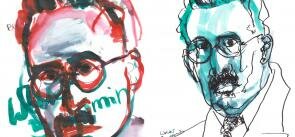Antonio Somaini's talk
What is a "medium"? And how can the history of the term - the way in which it has been used and theorized - help us answer this question?
- Read more about Antonio Somaini's talk
- Add new comment
This axis seeks to identify the conditions of emergence and consolidation of Film and Moving Image Studies in academia. It revolves around 3 main issues: the study of conceptual conditions, material and technological conditions, and institutional conditions.
Conceptual Conditions
Technological Conditions
Institutional Conditions
Institutions of Cinephilia
Institutions of social and community activism
Pedagogical Institutions
What is a "medium"? And how can the history of the term - the way in which it has been used and theorized - help us answer this question?
VISUAL STUDIES. Intersecting Art History and Film Studies
February 18, 2016 16h00
DB Clarke Theater
A discussion with Thomas Elsaesser and James Elkins
SCMS’ Fieldnotes Project Expands Selection of Film Studies Oral Histories.
The SCMS Fieldnotes project is pleased to present a new slate of oral history interviews, featuring many seminal scholars from the fields of film and media studies. New video and audio interviews include Tom Gunning, Mary Ann Doane, Francesco Casetti, and many more.
Our contemporary media landscape might be called the era of heightened seriality. In this talk, Professor Jason Mittell explores how serial storytelling has pervaded both film and television narrative, considering what formal elements define contemporary seriality, and how seriality is forged by industrial and viewing practices.

Laikwan Pang, Thomas Lamarre

From the mid-1940s, when Maurice Merleau-Ponty gave a lecture on film at the Institut des hautes études cinématographiques in Paris, which was subsequently published as ‘Le Cinéma et la nouvelle psychologie’ (‘Cinema and the New Psychology’), film scholars have shown a keen interest in the relationship between his philosophy and cinema.
In considering why it took so long for cinema to acquire sound it is important to compare between different historical periods. The slow-paced evolution of film sound (this was everything but a revolution) is not well known or documented in good measure because few people know just how diverse the environments for film screenings were during the first 30 years of cinema.

Although Walter Benjamin is frequently cited in film studies scholarship, there is little consensus on what he really offers the discipline. Working with several PhD students, I have tracked citations of Walter Benjamin in two major film studies journals, Cinema Journal and Screen from 1990 to 2014.
Professor Haidee Wasson has won the Peter Morris Prize for best article in the last two years of the Canadian Journal of Film Studies with "The Other Small Screen: Moving Images at New York's World Fair, 1939" published in issue 21.1 in 2012. The prize was announced at the Film Studies Association of Canada annual conference. Congratulations Haidee!